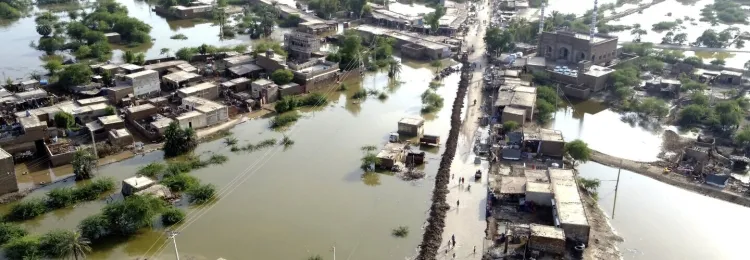Climate Change Threatens Gwadar, Pakistan: Rising Floods, Droughts, and Environmental Collapse
Gwadar in Baluchistan, Pakistan faces severe climate-related challenges, from flooding to droughts. This once-thriving port city is now battling the consequences of global warming and urbanization.

Once relatively shielded from the devastating effects of climate change, Gwadar, a coastal city in the Pakistani province of Baluchistan, is now facing a series of climate-related disasters. From severe droughts to dust storms and, most notably, flooding, the residents of this city are grappling with a reality that was once distant but has now become undeniable.
A Low-Lying Peninsula Threatened by Rising Seas and Global Warming
Gwadar, strategically positioned on the Arabian Sea, is bordered by the ocean on three sides. This low-lying peninsula is increasingly vulnerable to the effects of climate change. Global warming has caused waves in the Arabian Sea to grow in size and strength, worsened further by summer monsoon winds. Experts warn that the city’s low elevation makes it particularly susceptible to flooding and storm surges, drawing parallels to island nations that are battling similar existential threats.
While Gwadar is not an island, its situation is becoming increasingly dire, mirroring the experiences of island nations that have long warned of the lack of sufficient funding to combat climate change. With warmer air holding more moisture—about 7% more per degree Celsius—the city is now facing more intense and frequent rainfall events.
Severe Flooding and Water Management Challenges
In February of last year, Gwadar was pummeled by nearly 30 consecutive hours of rainfall. The intensity of the downpour washed away roads and bridges, severing communication lines and briefly cutting the city off from the rest of Pakistan. The effects of the flooding are still visible, with many homes in the city showing signs of damage. In neighborhoods like Shadoband, local leaders, such as Kadir Baksh, continue to grapple with water seeping into their properties.
Once, water from rains would take up to 10 days to dissipate; now, the rising water demands the use of generators every day to pump it out. Local officials blame land use changes and unauthorized urbanization for worsening flooding, while many residents point to large construction projects that have disrupted traditional drainage systems.
Urbanization and Infrastructure Strain
Gwadar has been at the heart of China’s Belt and Road Initiative, with billions of dollars invested in the development of a deep-sea port, international airport, expressways, and other infrastructure projects. While this foreign investment aims to transform Gwadar into a regional economic hub, it has not been accompanied by the necessary improvements in basic services like sewage and drainage systems. Residents continue to suffer from inadequate infrastructure, which exacerbates the effects of climate-related flooding.
Fisheries Under Threat: A Changing Ocean
Gwadar’s once-thriving fishing industry is also facing a decline, as rising sea temperatures, illegal fishing practices, and overfishing are taking a toll. Local fishermen report a significant reduction in their catches, with native fish species disappearing and fishing patterns shifting unpredictably.
The main culprit behind this decline is the illegal use of trawlers, which deploy harmful wire nets that scoop everything from rocks to plants, further depleting fish populations. Combined with the effects of rising sea temperatures, the fishing community’s livelihood is increasingly at risk.
Droughts and Decreasing Water Sources
Global warming has led to more evaporation, drying out soil and vegetation, and exacerbating the region’s ongoing drought problems. These dry spells are becoming more frequent and intense, affecting both agriculture and the water supply in the province. The combination of droughts, rising sea levels, and intense storms poses an existential threat to Gwadar’s residents, making what was once a vital blessing—the Arabian Sea—now a curse that endangers their lives and livelihoods.
Conclusion: Gwadar Faces an Uncertain Future
The situation in Gwadar, once seen as a burgeoning economic hub due to its strategic location and development under the Belt and Road Initiative, now reflects the broader environmental challenges that many coastal and low-lying regions are facing in the era of climate change. As global warming worsens, the peninsula is at risk of being overwhelmed by a combination of rising sea levels, severe flooding, and extended droughts. The challenges in Gwadar underscore the urgent need for comprehensive climate action and resilient infrastructure to protect vulnerable communities in the face of an uncertain future.
What's Your Reaction?
















